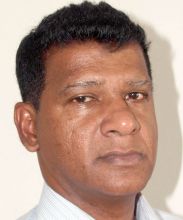
In the wake of the celebration of the Elimination of Violence against Women and in view of marking the “16 Days of Activism” campaign, the European Union (EU) Delegation organised a forum-debate on the theme “Stop Violence against women and girls.”
Publicité
This event was held at the Gold Crest Hotel and it was organised in collaboration with the Ministry of Gender and Equality, Child Development and Family Welfare. The forum-debate brought together five speakers namely:
- The Honorable Mrs. Roubina Jadoo-Jaunbocus, Minister for Gender Equality, Child Development and Family Welfare;
- Mrs Marjaana Sall, Ambassador of the EU to the Republic of Mauritius and the Republic of Seychelles;
- Mrs Johan Moutou-Leckning, Senior Assistant, Director of Public Prosecutions;
- Mrs Sylvia Rajiah, Police Chief Inspector and
- Mrs Sheetul Gigabhoy-Sauhoboa, Vice President of SOS Women and State Counsel at the Attorney General Office.
The conference was moderated by Ms. Shirin Aumeeruddy-Cziffra, President of the Public Bodies Appeal Tribunal, former Attorney General and Minister for Women’s Rights and Family Affairs.
During the conference-debate, it was recognised that violence against women and girls is a widespread human rights violation worldwide. Despite the campaigns and actions of the public authorities, non-governmental organisations, violence is a real scourge that continues to affect the lives of many women and girls. On this occasion, Mrs Marjaana Sall, reiterated the EU’s commitment to defend women’s rights both inside and outside the EU.
She advanced that “it is essential to continue to educate all citizens about the fact that the violence against women and girls is unacceptable and must be combatted on a daily basis through a real change in attitude and by taking concrete actions.”
During her intervention, Mrs Sall announced that the EU Commission will provide technical assistance for the drafting of the draft law on Gender Equality and it shall also extend a grant of Rs 8 Million to the National Human Rights Commission for awareness-raising actions both in Mauritius and Rodrigues.
The floor was then for the Minister, Honorable Mrs Roubina Jadoo-Jaunbocus to intervene. The Minister reiterated that the tackling of violence remains among the Government’s priorities. She advanced that addressing violence against women and girls implies working with both the victim and the perpetrators including children who are witnessing domestic violence.
She also accentuated on the various services offered by the six Regional Family Support namely: first hand counselling; psychological counselling; legal advice/assistance at Court; assistance to victims of domestic violence; referring victims for temporary accommodation in shelters and providing counselling services to perpetrators.
The Minister also accentuated on the need for a National Domestic Violence Protocol to ensure inter-agency collaboration in the treatment of domestic violence cases and also, on the urgent need for setting up an integrated support service so as to provide a comprehensive system that will provide immediate, consistent and timely support and counselling to victims on a 24-hour basis.
The debate was further pursued with Mrs Moutou-Leckning’s intervention. She addressed the audience on the legislations under which an offender may be prosecuted for exercising violence against women. We noted that violence may take various form namely: physical, sexual, ill treatment, verbal or moral, harassment, sequestration, among others.
One of the most common form of violence includes moral violence which is often exercised through the use of telecommunication services such as telephone, SMS and email to convey abusive messages.
This is catered for at Section 46 of the Information and Communication Technologies Act 2001. Mrs Moutou-Leckning also reminded the audience that it is an offence to harass sexually; assault; verbally abuse; swear or insult; bully or use threatening behaviour in the course of or as a result of one’s work (Section 54 of the Employment Rights Act). She also tackled the various Recommendations of the Report of the Advisory Committee on Reinforcement Framework for the Protection from Domestic Violence.
The next panellist was Mrs Sylvia Rajiah. Her discussion in essence covered the main difficulties encountered by police officers when dealing with domestic violence cases and these include: allotting the required time to victims who are very often in a confused state of mind.
This is very important so as to be able to extract relevant facts from the victims. The second difficulty relates to finding a solution or immediate solution for related problems like custody of children in case of denial from the other party, among others.
Mrs Rajiah also dealt with the positive effects following the Report of the National Coalition against Domestic Violence Committee in December 2015 and following the amendments brought to the Protection against Domestic Violence Act in 2016 and these include:
- The victim of domestic violence is now interviewed in another room, off the charge room to ensure confidentiality;
- In case where the victim is injured, he/she is provided with transport and is accompanied by a police officer of the same sex to the hospital;
- Police makes a follow up after the issue of a protection order;
- Victim is accompanied to a place of safety or shelter by a police officer.
She ended her discussion by covering the most common prevention strategies used by the police for cases of domestic violence. At last, Mrs Sheetul Gigabhoy-Sauhoboa talked on the role played by the SOS Women in the fight against violence on women and girls.
During the conference-debate, the panel members agreed that the elimination of violence against women and girls is a prerequisite for the promotion, protection and respect of human rights, gender equality, democracy and economic growth. Violence against women has significant economic costs especially in terms of lost income for women and their families and lower productivity.
It is estimated that the cost of violence against women could represent around 2% of the world’s Gross Domestic Product. At the end of the various interventions, the panellists took questions from the audience and the debate proved to be very fruitful and enriching for all participants.
Mrs Johan Moutou-Leckning
Senior Assistant DPP
Pooja Domun
Legal Research Officer

Notre service WhatsApp. Vous êtes témoins d`un événement d`actualité ou d`une scène insolite? Envoyez-nous vos photos ou vidéos sur le 5 259 82 00 !















![[Explik Ou Ka thématique PART 2] - Achats de fin d'année : Comment éviter les mauvaises surprises ?](https://defimedia.info/sites/default/files/styles/square_thumbnail/public/eok_201224_0.jpg?itok=MwpRjlhh)
![[Explik Ou Ka thématique PART 1] - Achats de fin d'année : Comment éviter les mauvaises surprises ?](https://defimedia.info/sites/default/files/styles/square_thumbnail/public/eok_201224.jpg?itok=YM_k6HPD)




![[Satiriquement Vôtre] Reza ne vise pas la lune](https://defimedia.info/sites/default/files/styles/square_thumbnail/public/reza_thumb.jpg?itok=TxcnZDkg)